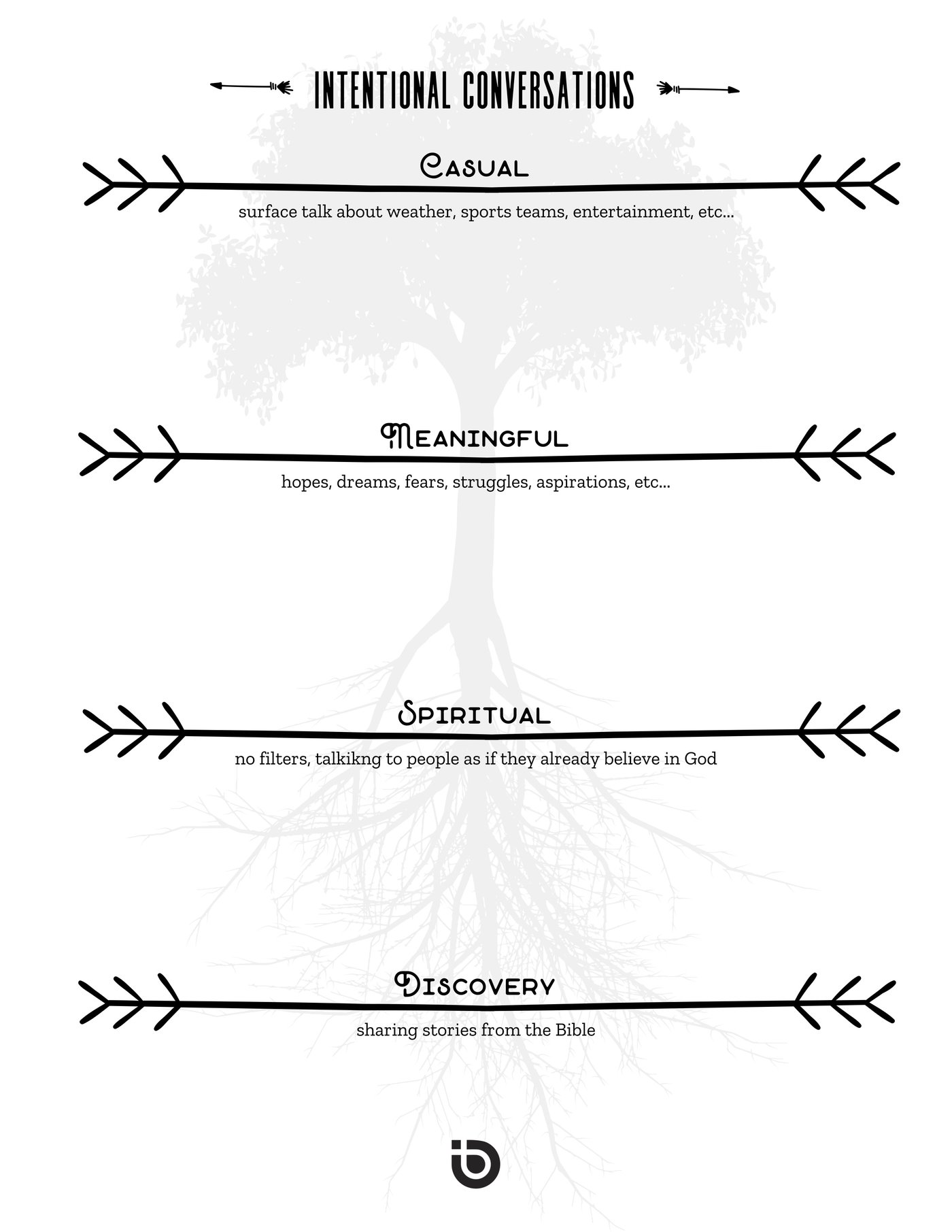Intentional Conversations
paul durbin, september 2020
We believe that discipleship begins the very first moment we have a conversation with someone.
Why? Because discipleship is much more than teaching the “how’s” and “why’s” of Christianity — discipleship is modeling the ways, life and teaching of Jesus to others.
Embracing this thought leads us to be more intentional in our conversations and interactions with others — because we understand that what we say and how we live has the potential of leading them into their own faith journey with Jesus.
How can we be more intentional?
We can be more intentional as we understand the various depths of conversation— and pray that over time our conversations can go to greater depths.
casual conversations
Casual conversation is basic surface talk we might have with anyone (the weather, sports, entertainment, or the latest movie). It’s non-threatening, and non-emotional.
Jesus demonstrates this a few times in scripture. When he approached the woman at the well in John 4, he simply started the conversation by saying, “Will you give me a drink?”
Similarly, in Luke 24, he approached a couple people and said, “What are you discussing together as you walk along?”
At this stage of the conversation, we likely know each other’s names, but not much more.
meaningful conversations
Meaningful conversation happens when we begin to talk about hopes, dreams, fears, struggles, aspirations, etc.
Jesus again demonstrates this in the conversations mentioned above.
In the conversation with the woman at the well, she said to Jesus, “You are a Jew and I’m a Samaritan woman. How can you ask me for a drink?” In other words, she made reference to the pain and division that existed between their people groups.
In the conversation with the pair on the road, one of them simply said, “we had hoped.” It’ shows us how Jesus was willing to go past the casual, and began to listen to people’s hopes and dreams.
In meaningful conversation, we not only know each other’s names, but we’re beginning to hear each other’s stories.
spiritual conversations
Spiritual conversations are when we stop using our “Christian filter.” You know how it is — if we’re talking to a Christian, we tend to talk one way, and if we’re talking to anyone else, we talk another way, right?
Why? Why do we mention the good things God is doing in our life to other believers — but not to others? Why not talk with people as if they already believe in God?
In Jesus’ conversations with others, things quickly went tot the spiritual.
With the woman at the well, he casually mentions, “if you knew the gift of God…”
With the guys on the road, they have no hesitation to mention a “vision of angels.”
At this stage of the conversation, we stop filtering our speech. If God is doing something in us, we talk about it — and if others have a spiritual story of some sort, we don’t hesitate to listen.
discovery conversations
Spiritual conversions and discovery conversations are both “spiritual” in nature — the difference is that in a discovery conversation, we are making intentional references to the truths and stories found in the Bible.
A spiritual conversation might talk about “God,” whereas a discovery conversation will mention “Jesus.”
A spiritual conversation might center on general spiritual truths (God is good, for example), but a discovery conversation will point to where that truth is found.
In conversation, we might say, “You’re right, God is Good! In fact, Jesus said so in the book of Mark…”
Mark 10:18 (NIV) 18 “Why do you call me good?” Jesus answered. “No one is good—except God alone.
In a discovery conversation, our hope and prayer is to invite our friend to further discover the truths of the Bible. This might happen through Alpha, taking part in a Discovery Group, or something similar.
Take it with you
We have a PDF attached that you can download and print out. Use it to write down the names of people you have conversations with — and be intentional about taking each conversation to a greater depth, in the hope that our friends and neighbors can discover the good news of Jesus.



